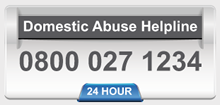What is Domestic Abuse?
Domestic Abuse is the physical, emotional, sexual or financial abuse of women by a person they have been in a relationship with or from a family member they have lived with, either currently or in the past. The perpetrator could be a husband, male or female partner, father/ brother or son. They can also be female (e.g. mother/sister/daughter) or there may be more than one.
Domestic abuse can take the form of:
| Physical: | Hitting, kicking, punching, pushing, slapping. |
| Verbal: | Name calling, derogatory language |
| Emotional: | Threatening, demeaning, isolating from seeing family/friends. |
| Financial: | Controlling the money |
| Sexual: | Being forced to have sex, watch sexual behaviour, unwanted/inappropriate touching. |
If you are experiencing any of the above or other coercive control, you may feel it's your fault ( you are not to blame) and trapped (you do have choices).
- You may feel powerless but we can help you empower yourself and support you to explore any changes you want to make.
- You may feel nervous/anxious and you may be trying hard to anticipate the mood of the perpetrator to feel "safe" (women have said this is like "walking on eggshells")
- You may feel indecisive and exhausted, which can make it harder to make decisions.
If this is how you feel, you may be experiencing domestic abuse. No one deserves this.
You may not want to leave-that's up to you but we can support you in the process, whatever you decide.
Women's Aid describe leaving an abuser as a process-not an event. The start of that can be naming what you are experiencing as domestic abuse and talking to a friend or a worker, in confidence, about this.
The lives of you and you children can be at risk. Children and young people can be affected by abuse.
They might witness the abuse or hear the arguments from an adjacant room.
They may see bruises on their Mum or indeed be abused themselves.
This can mean children feel scared, upset or feel somehow it is their fault. This is also domestic abuse.
Some myths about domestic abuse:
- It's because he has experienced abuse as a child
- It's because he loves me
- She likes it or she would leave
- It's caused by mental health issues.
- He's a "good dad" even though he may do some/all the above in front of the children.
- It's because he was under the influence of substances (drink/drugs are not the cause of abusive behaviour)
The use of any forms of abuse are about choice and control. Most perpetrators do not behave the same way to: e.g. their boss or men in the pub. They do not need "anger management",if managing their anger in other contexts/relationships.
Women's Aid has challenged these myths which have been heard in the courts, media, and other structures in society.These reinforce inequality, within which abuse can thrive.
There is no excuse for domestic abuse.


